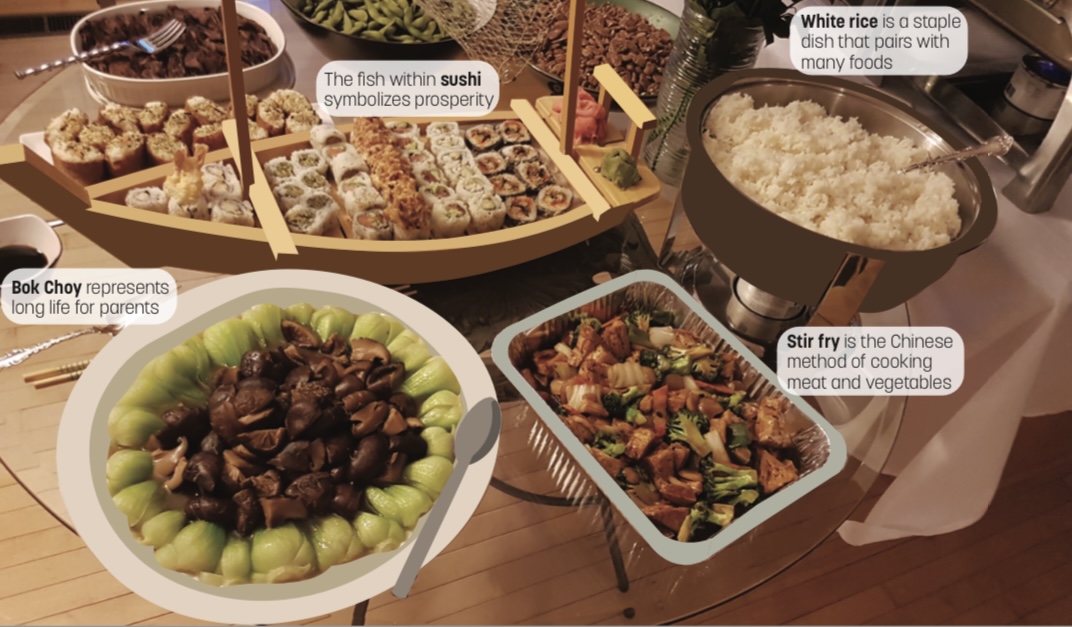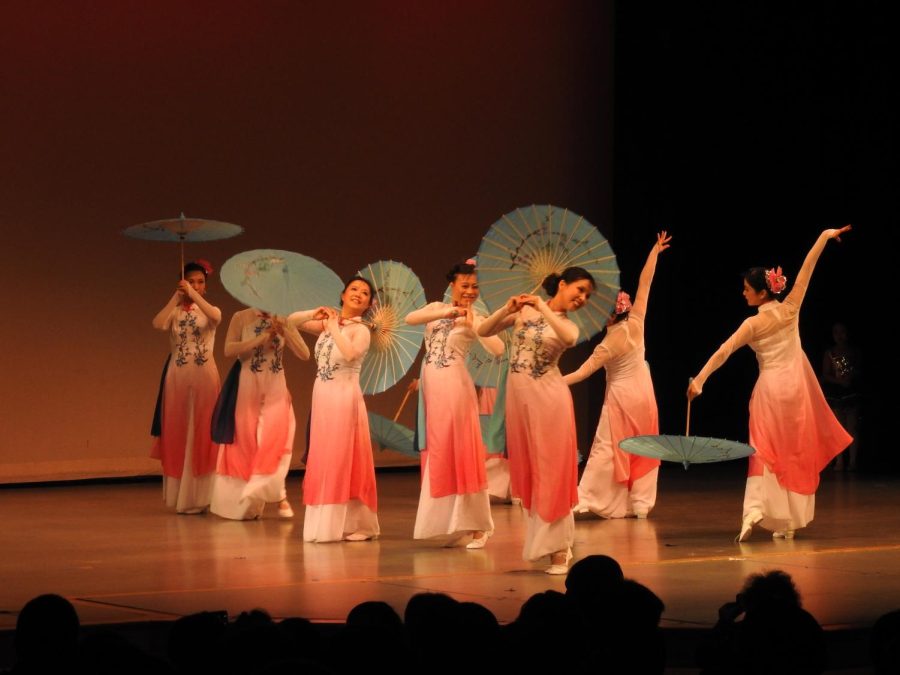According to Chinese teacher Tungfen Lee, Chinese New Year is a centuries-old celebration held on the first day of the lunar calendar, which for this year lies on Feb. 1. According to Columbia University, the celebration originates from the lunar calendar, a calendar system using the shapes of the moon to measure periods of time for agricultural purposes. Families celebrate through various traditions, such as junior Justine Wang, who usually goes to a Chinese New Year Party.
“We had a family who lived here who threw a pretty big one every year but they recently moved away, so we’re doing the party this year, which is cool,” she said.
Like many things, COVID-19 has changed the way her family celebrates with an absence of a party in 2021 and masks possibly required for guests.
In the past, party hosts would put on a puppet show for the children to celebrate and explain the new year zodiac signs of which there are 12 named after animals, 2022, for instance, is the year of the tiger.
Wang wasn’t a fan. “(The show) was kind of stupid. I didn’t really like it. Yeah, they just had the kids run around and they had everyone bring some food and you just eat and talk.”

However, Lee said there are many traditions that remain to this day, including putting up decorations, giving red envelopes, fireworks and watching dragon or lion dances.
“The festival was traditionally a time to honor deities as well as ancestors and now it is also a time to feast and to visit family members,” Lee said through email.
Senior Zoey Foley considers the way her family celebrates more unconventional.
“We don’t make our own chinese food, we get takeout,” Foley said. “Or we make, embarrassingly enough, Korean dumplings because they’re easier. They’re just wonton wrappers that you wet down with your fingers and they’re really quick and fun to make, so that’s kinda how my family celebrates.”
Foley said that her family at times excludes traditions. “We try to stick to authentic Chinese New Year but we don’t clean the house, I am the most messy person you will ever meet but I should start using that as an excuse to clean but I’m too lazy. We don’t travel either, since my family lives a bit far and we don’t celebrate it for 14 days either, we just chose one day in the duration of the 14 day period.”
Foley’s family also does things not traditionally associated with Chinese New Year, such as eating mooncakes, a treat traditionally associated with the Mid-Autumn festival.
She said, “We just skip the parts we don’t like and we made it a tradition, like I am the person who will get mooncakes and eat them during Chinese new year, if I can find them since they are delicious (and) I am so hungry.”
Wang also said her family also doesn’t clean the house for the new year, saying that there are so many traditions that celebrations can differ between families.
“I know it’s traditional to eat fish for chinese new year because that’s a thing, but I don’t really know why it’s lucky. And you’re supposed to clean your house before Chinese New Year to get rid of bad spirits or whatever, we don’t do that because we don’t clean our house,” she said. “I don’t know there’s just a lot of stuff that a lot of families do to the point where you don’t even know why you do them anymore you just do, because you have to do them.”
Another way that Foley’s celebration may differ from Wang’s is the reason her family celebrates. Foley is the only Chinese member of her family, with a Korean brother and European parents. As such, for her family, Chinese New Year isn’t merely the celebration of a new year, but a celebration of her as well.
“Because I’m adopted from China and I never got the experience of living with a Chinese family so my parents, for as long as I remember, felt bad because they could give me almost everything I could ever ask for except what it’s like to be raised in a Chinese family,” she said.
She also said it allowed her to connect more with her Chinese identity.
“It’s more of a way to celebrate the fact (that I am Chinese). One of the reasons I joined the National Chinese Honor Society is because I’ve always been interested in Chinese culture all my life, but I was raised in a European household so I’ve always celebrated Saint Patrick’s Day, Easter and Christmas,” Foley said. “There are a lot of (Chinese) holidays, but Chinese New Year is the one that I celebrate. It’s just a celebration of me and my brother, since it’s also the Lunar New Year so we also celebrate the fact that my brother is with us as well, since he’s also Asian American.”
COVID-19 has also impacted the way she celebrates Chinese New Year, as she would typically celebrate it with her Girl Scout troop, one made specifically for Chinese females adopted from China, but COVID-19 canceled plans in 2020 and led to a disbandment of the troop.
Though Foley and Wang celebrate for different reasons and in different ways, they are both excited for celebrating the new year.
Wang said, “ You just catch up with the other Chinese, or sometimes people who aren’t Chinese are invited, families in the area and eat a lot of food and it’s a good time.”

































![AI in films like "The Brutalist" is convenient, but shouldn’t take priority [opinion]](https://hilite.org/wp-content/uploads/2025/02/catherine-cover-1200x471.jpg)










































![Review: “The Immortal Soul Salvage Yard:” A criminally underrated poetry collection [MUSE]](https://hilite.org/wp-content/uploads/2025/03/71cju6TvqmL._AC_UF10001000_QL80_.jpg)
![Review: "Dog Man" is Unapologetically Chaotic [MUSE]](https://hilite.org/wp-content/uploads/2025/03/dogman-1200x700.jpg)
![Review: "Ne Zha 2": The WeChat family reunion I didn’t know I needed [MUSE]](https://hilite.org/wp-content/uploads/2025/03/unnamed-4.png)
![Review in Print: Maripaz Villar brings a delightfully unique style to the world of WEBTOON [MUSE]](https://hilite.org/wp-content/uploads/2023/12/maripazcover-1200x960.jpg)
![Review: “The Sword of Kaigen” is a masterpiece [MUSE]](https://hilite.org/wp-content/uploads/2023/11/Screenshot-2023-11-26-201051.png)
![Review: Gateron Oil Kings, great linear switches, okay price [MUSE]](https://hilite.org/wp-content/uploads/2023/11/Screenshot-2023-11-26-200553.png)
![Review: “A Haunting in Venice” is a significant improvement from other Agatha Christie adaptations [MUSE]](https://hilite.org/wp-content/uploads/2023/11/e7ee2938a6d422669771bce6d8088521.jpg)
![Review: A Thanksgiving story from elementary school, still just as interesting [MUSE]](https://hilite.org/wp-content/uploads/2023/11/Screenshot-2023-11-26-195514-987x1200.png)
![Review: "When I Fly Towards You", cute, uplifting youth drama [MUSE]](https://hilite.org/wp-content/uploads/2023/09/When-I-Fly-Towards-You-Chinese-drama.png)
![Postcards from Muse: Hawaii Travel Diary [MUSE]](https://hilite.org/wp-content/uploads/2023/09/My-project-1-1200x1200.jpg)
![Review: "Ladybug & Cat Noir: The Movie," departure from original show [MUSE]](https://hilite.org/wp-content/uploads/2023/09/Ladybug__Cat_Noir_-_The_Movie_poster.jpg)
![Review in Print: "Hidden Love" is the cute, uplifting drama everyone needs [MUSE]](https://hilite.org/wp-content/uploads/2023/09/hiddenlovecover-e1693597208225-1030x1200.png)
![Review in Print: "Heartstopper" is the heartwarming queer romance we all need [MUSE]](https://hilite.org/wp-content/uploads/2023/08/museheartstoppercover-1200x654.png)




